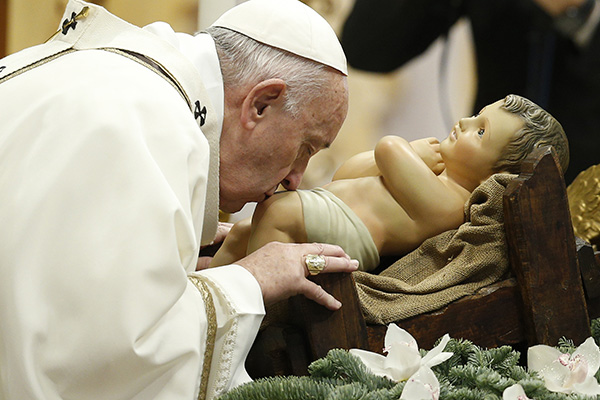
By Elise Harris
ROME (Crux) — Pope Francis said Jan. 6 that faith is about more than knowledge and doctrine, pointing to the three wise men who visited the infant Jesus as an example of what it means for the Church to “go out,” seeking to worship God rather than oneself.
In his Mass marking the Catholic feast of the Epiphany, commemorating the visit of the three Magi to the infant Jesus, the pope noted how the men not only came bearing gifts, but upon seeing the child, “they bowed down and worshiped him.”
According to scripture, the Magi visited the infant Jesus in Bethlehem, bringing gifts of gold, frankincense and myrrh. In Italy, the Jan. 6 feast of the Epiphany is celebrated with the figure of the “Befana,” a legendary old woman in Italian folklore who brings children gifts on the eve of the feast.
“Once we lose the sense of worship, we lose our direction in the Christian life, which is a journey towards the Lord, not towards ourselves,” he said, and pointed to several biblical figures in the day’s Gospel passage who he said lost their way, including King Herod and the chief priests and scribes.
Noting how Herod initially asked the Magi to inform him of where Jesus was so that he himself could go and worship, Pope Francis said, “The fact is that Herod worshiped only himself; that is why he wanted to rid himself of the child through a lie.”
“When we do not worship God, we end up worshiping ourselves,” he said, adding that the same thing goes for the Christian life, which, in failing to worship God, “can become a discreet way of affirming ourselves and our own abilities.”
“How many times have we confused the interests of the Gospel with our own?” he asked. “How many times have we cloaked in religiosity the things we find convenient? How many times have we confused God’s power, which is for serving others, with power of this world, which is for serving ourselves!”
Pointing to the chief priests and scribes, Pope Francis noted that they have studied the scriptures and prophecies and can recite them to the verse, meaning they knew exactly where Jesus, the messiah, was born, but chose not to go.
The pontiff, using these figures as an example, said they offer a lesson for Christians that “it is not enough to be knowledgeable.” Rather, he said, “unless we step out of ourselves, unless we encounter others and worship, we cannot know God.”
“Theology and pastoral effectiveness mean little or nothing unless we bend the knee; unless we kneel down like the Magi, who were not only knowledgeable about planning a journey, but also capable of setting out and bowing down in worship,” he said.
When a person becomes capable of true worship, “we come to realize that faith is not simply a set of fine doctrines, but a relationship with a living person whom we are called to love,” he said, adding that what really counts “is not our fine ideas,” but one’s ability to put God at the center of their life.
Worship, he said, releases one from the “slavery to oneself” by focusing on “ridding ourselves of useless things and addictions that anesthetize the heart and confound the mind.”
“In worship, we learn to reject what should not be worshiped: the god of money, the god of consumerism, the god of pleasure, the god of success, the god of self. Worship means bending low before the Most High and to discover in his presence that life’s greatness does not consist in having, but in loving,” Pope Francis said.
This also goes for what comes out of the mouth, he said, explaining that worship implies “learning to use words that do not wound but console.”
Pope Francis closed his homily urging Mass-goers to ask themselves if they know how to worship and if they make time for it in their daily schedules, saying there are many Christians who pray, but are incapable of praising God.
“It is up to us, as a church,” he said, “to put into practice the words we prayed in today’s Psalm: All the peoples on earth will worship you, O Lord.”
